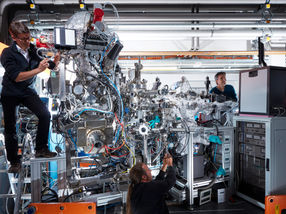BGU and University of Michigan partner to develop renewable energy technologies
Advertisement
The University of Michigan and Ben-Gurion University of the Negev in Israel will forge a research partnership to collaborate on developing renewable technologies.
A memorandum of understanding to establish the partnership was signed by Vice President for Research Stephen Forrest and BGU Vice President and Dean for Research and Development Moti Herskowitz.
Each university has pledged half of the $1 million that will jumpstart the three-year program. At U-M, the funding is provided by the Office of the Vice President for Research and the U-M Energy Institute.
The partnership aims to bring diverse minds together to progress toward solving major challenges in the areas of advanced vehicle fuels, solar energy and thermoelectric materials, which convert heat to electricity. Beginning this month, collaborative faculty teams can apply for grants to start projects in one of these three areas.
"We live in a global economy," Forrest said. "Universities need to globalize their activities because we need to solve problems that are larger than one country can manage alone. When faculty at universities from across the world come together, they bring different cultures and different objectives, and when you mix them, you get a lot more than just the sum of the parts."
BGU has been at the forefront of the energy research for more than 30 years, Herskowitz said. The university previously has hosted a joint workshop with U-M on renewable energy with an emphasis on solar energy, liquid fuels and thermoelectricity.
"We look forward to collaborating with the U-M researchers on the challenging issues related to renewable energy and trust that the agreed model of collaboration has the potential of generating novel scientific and technological information with potential applications," Herskowitz said.
The program grew out of Forrest's visits to Israel during the past five years. One of his objectives was to examine the country's well-known entrepreneurial culture.
"There's an enormous number of startups that come out of Israel," he said. "We have a lot to learn from them."
Forrest said he expects that solar energy researchers from Israel, for example, might approach the problem with more applied perspective than some American researchers, and together these cultures could make breakthroughs.
Up to six projects will be funded during the first year. An annual technical workshop will showcase the research outcomes.






























































